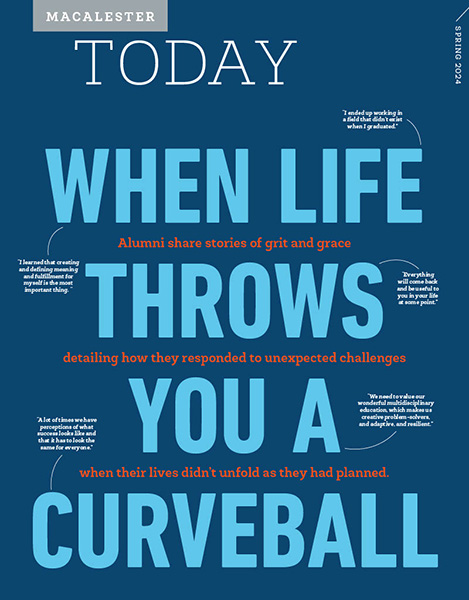
By Laura Billings Coleman / Photo by David J. Turner
According to a September 2023 survey by the Pew Research Center, when asked to describe politics in the United States these days in a single word or phrase, 79 percent of Americans expressed a negative sentiment. The word “divisive” appeared most frequently, followed by the term “polarized.”
On college campuses, a survey by the Foundation for Individual Rights and Expression (FIRE) of students from 254 institutions, including Macalester, found that more than half of today’s students nationwide fear reputational damage from misunderstandings of what they’ve said or done, while more than a quarter of students report they feel pressure to avoid discussing controversial topics in their classes.
In these polarizing times, how do we speak openly with and learn from each other in our classrooms and in our communities?
It’s a question that Charlie Birge ’15, St. Paul, has been asking with growing interest since graduating from Macalester with a degree in American studies. Now a fundraising writer for FIRE, a nonpartisan group committed to advancing free speech and First Amendment rights on college campuses, Birge also is the youngest leader of the Macalester Alumni of Moderation (macmods.org), an alumni group founded in 2004 by Roger Peterson ’67, Bob Spaulding ’64, and Jim Burho ’70, that promotes free speech, academic freedom, and viewpoint diversity.
“I’m not someone who believes that academia needs to be perfectly split, 50-50, between liberals and conservatives,” he says. “But if we want to find solutions, we need to be able to have conversations across lines of difference.”
Birge, who spent two years at Northwestern University before transferring to Macalester, says a class on race and law taught by American studies professor Duchess Harris was the first college course to introduce him to conservative political views. “She assigned us a book that was critical of critical race theory, and our final project was to analyze it and put it into conversation with everything we’d read up to that point,” he says. “It was a cool opportunity, but at the time, I didn’t see anything of value in these more conservative ideas.”
But Donald Trump’s presidential victory soon after Birge graduated was a political turning point. “I didn’t feel like his election could only be explained by right-wing populism, racism, and xenophobia, though I felt like those things were definitely part of it,” he says. “I just thought, Something is wrong here. We’re not talking to each other as a country. We don’t understand each other. And we need to figure out ways to build bridges.”
Since then, Birge has been trying to understand the growing partisanship of US politics, and promote bipartisanship. After earning a master’s degree in cultural studies at The Ohio State University, Birge served as an AmeriCorps volunteer in Orange County, Calif. There he got involved with a local chapter of the Citizens Climate Lobby, an environmental group that stresses the importance of bipartisan support for pushing new climate policies. A growing interest in Buddhism also made him more committed to seeing the humanity in people whose views are challenging. “In Buddhism, you have to try to extend your goodwill to everybody,” he says. “It can sound like a cliché, but on a deeper level, it’s something we need more of in our culture.”
Inspired by the writing of Jonathan Haidt, the social psychologist known for The Righteous Mind: Why Good People are Divided by Politics and Religion, Birge got involved with Braver Angels, a cross-partisan, volunteer-led movement to teach people to talk across differences. Birge has participated in the group’s signature Red/Blue Workshops, civic discussions about divisive issues that are modeled on the principles of couples therapy. Self-identified liberals go into one room, conservatives another, and both discuss the stereotypes the “other side” holds about them. What do the stereotypes get wrong, and in what ways do they hold a kernel of truth? Then the groups reunite, and each shares its insights. “It’s such a powerful thing to do, because you’re not shying away from the conflict and the nasty things that people say about each other,” Birge says. “But as you reflect on it, you realize there are people on the other side who share your concerns about their side. Not everyone agrees with everything on their side, which really makes clear that this is all more complicated than we thought.”
In March, Macalester became a co-sponsor of Braver Angels of Minnesota (mn.braverangels.org). Birge applauds the college’s sponsorship as well as new programs like the Congress to Campus project that’s bringing retired lawmakers to campus to discuss how they overcame divisions to broker bipartisan policy.
While Birge credits his liberal arts education with developing his critical thinking capabilities, he will continue to work with the Mac Mods, including at Reunion 2024 during the group’s annual alumni discussion, to encourage viewpoint diversity and vigorous debates. During an already fraught election year, he hopes other alumni will join him.
“More free speech is important for overcoming our political divides,” he says. “It’s important to seek out what people are saying on both sides, and see what I agree with and what I don’t agree with and where we might find common ground.’’
St. Paul writer Laura Billings Coleman is a frequent contributor to Macalester Today.
May 17 2024
Back to top





